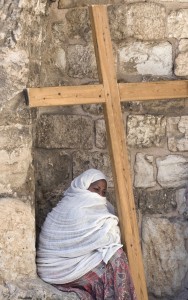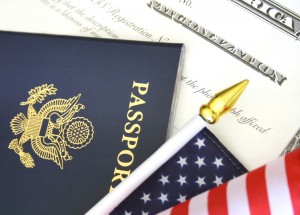Courtesy of the Gatestone Institute.
The most historic and emblematic sign of Muslim persecution of Christians returned in February: Christians in Raqqa, Syria, under the occupation of the Islamic State of Iraq and Syria [ISIS], which has since consolidated more territory, were given the three classic choices of Islam: 1) convert to Islam or 2) pay jizya (tribute or extortion money, as in the Koran 9:29) and uphold all the conditions stipulated in the medieval Conditions of Omar—which include heavy restrictions on Christian worship—or 3) the sword.According to the BBC, ISIS issued a directive: citing the Islamic concept of “dhimma”, [which] requires Christians in the city to pay tax of around half an ounce (14g) of pure gold in exchange for their safety. It says Christians must not make renovations to churches, display crosses or other religious symbols outside churches, ring church bells or pray in public. Christians must not carry arms, and must follow other rules imposed by ISIS (also known as ISIL) on their daily lives. The statement said the group had met Christian representatives and offered them three choices—they could convert to Islam, accept ISIS’ conditions, or reject their control and risk being killed. “If they reject, they are subject to being legitimate targets, and nothing will remain between them and ISIS other than the sword,” the statement said.A Pew study confirmed that Christians are “the most persecuted religious group in the world” and that their persecution is occurring primarily throughout the Islamic world. In the category of “Countries with Very High Government Restrictions on Religion,” Pew lists 24 countries—20 of which are Islamic and precisely where the overwhelming majority of “the world’s” Christians are actually being persecuted.February’s roundup of Muslim persecution of Christians around the world includes (but is not limited to) the following accounts, listed by theme and country in alphabetical order, not necessarily according to severity.
Attacks on Christian ChurchesNigeria: Among other church-related atrocities, the Islamic terror group Boko Haram attacked a church during Sunday services in the Muslim majority northeast of the nation. According to Christian Today, “They locked the doors before the end of the service and shot at the congregation, slitting the throats of those who tried to escape. They also detonated bombs before going on a four hour rampage, burning houses and taking hostages from the village.”
Sudan: “In what Sudanese Christians believe is part of a campaign by Islamist President Omar al-Bashir to rid the country of Christianity,” reported the Morning Star News, “bulldozers accompanied by local police and personnel from the National Intelligence and Security Services destroyed the Sudanese Church of Christ building in the Ombada area of Omdurman, across the River Nile from Khartoum.” According to a local Christian: “The government has confiscated the land where the church was built—please pray for the church to get a place for worship. We had not any prior indication from the officials that the church would be destroyed; they have not even warned us.” The only reason officials gave for demolishing the 300-member church was that it was located in a “Muslim area” and so “not wanted there,” reported one church member. The police officer in charge of demolition reportedly said: “We have orders from above to demolish this church building. We do not want any church in this area.”
Zanzibar: Several churches were attacked in the Muslim majority islands. A bomb that was remotely detonated rocked the entrance of Christ Church Cathedral on February 24. The day before, Sunday, February 23, another bomb exploded near the door of the Evangelistic Assemblies of God Zanzibar Church, just before the end of service. The bomb caused minor injuries to several worshippers. Earlier, a mob invaded the Sunday service of a Pentecostal Evangelism Fellowship of Africa church; apparently they intended to kill the senior pastor. After failing to find him, they battered a visiting clergyman. According to local activists, “Additionally at least 20 churches have been looted and either burnt or demolished by mobs in recent months.”
The Slaughter of Christians
Egypt: Near Aswan in Upper Egypt, one Mahmoud Muhammad Ali went on a rampage, attacking several Christians, including employees of two Coptic-owned pharmacies and two female students who were walking nearby. A woman, stabbed in the neck, was killed, and another severely wounded. According to the brother of the slain woman, Madline, 30, “He killed her because she is a Christian. There was nothing else. He was targeting Christian pharmacies. He went and tried to attack a Christian, and when he failed, he went to the next Christian pharmacy.” Human rights activists and Copts also warned that authorities and others were trying “to shift blame away from Ali and establish the groundwork for his defense.” That is, they were trying to establish that he was “insane or somehow otherwise mentally incompetent to stand trial, allowing him to escape punishment. The tactic has been employed frequently in clear-cut cases of violence against Copts. Because of it, the impunity with which people can attack Christians in Egypt without punishment encourages other attacks.”
Kenya: Lawrence Kazungu Kadenge, 60, a church leader in Mombasa, was killed near his church, Glory of God Ministries Church, for reportedly preaching Christianity near a mosque where jihadis [holy warriors in the cause of Islam] were being trained. During the slaying of the pastor, a witness heard one of two suspects say, “Make sure you have killed him—he has been promoting his religion near our mosque.” According to another church leader, “We as the pastors in Mombasa are living in fear because pastors are being eliminated one by one. We need prayers that the church will survive these attacks as we are being targeted by the radical Muslims.” According to a Mombasa police official, “This is not a mosque for prayers but a base for recruiting Muslim youths to engage in terrorist activities.”
Libya: After Ansar al-Sharia—a group that appears connected to Egypt’s now ousted Muslim Brotherhood—offered a reward to any Benghazi resident who helped round up and execute the nation’s Coptic Christian residents, seven Copts were identified as Christians, forcibly seized from their homes by “unknown gunmen,” taken out and executed some 20 miles west of Benghazi (graphic pictures appear here). A few days later, another Coptic Christian, Salama Fawzi, 24, was shot in the head — again by several “unknown gunmen” — while unloading food in front of his grocery stand in Benghazi. The day after that, another corpse was found, believed — from the small cross tattooed on his wrist traditionally worn by Egyptian Christians — to be that of a Copt.
 Bodies of Coptic Christians lay in a field near Benghazi, Libya, after their abduction and execution by Islamists in February.
Bodies of Coptic Christians lay in a field near Benghazi, Libya, after their abduction and execution by Islamists in February.
Nigeria: Chanting “Allah is great,” reports the AP, “suspected Islamic militants gunned down dozens of Christian villagers and slit the throats of others” in a Saturday night raid on Izghe village in Borno state, a primarily Christian village in a Muslim-majority region. Over 100 were slaughtered in the attack, including an elderly woman. A local farmer who escaped said the attackers, whom authorities suspect are affiliated with Boko Haram, had gone door-to-door looking for those hiding in their houses: “The attackers came around 9:30 pm in six trucks and some motorcycles. They were dressed in military uniform. They asked men to assemble at a place, and began hacking and slaughtering them.” Gunmen also attacked a fishing village on Lake Chad on Saturday, and killed an unspecified number of residents. A survivor said several people drowned in the lake while trying to escape the Islamic gunmen. Separately, more “suspected Islamic militants,” reports the Daily Mail, “killed 43 students in a pre-dawn attack Tuesday on a northeast Nigerian college… The terrorists, thought to be from Boko Haram, set a locked hostel on fire, before shooting and slitting the throats of those who tried to climb out the windows. Some were burned alive.”
Pakistan: A 24-year-old Christian husband and father of two, arrested by the police on the false charge of theft, was, during an all-night interrogation, “tortured to death” at the police station, according to Asia News. The police said that he had committed suicide by hanging himself. But autopsy results revealed that he died from “serious internal injuries.” Afterwards, the Catholic Church of Pakistan and civil society groups staged a protest against police brutality, and said that while police brutality in Pakistan is widespread, if a Christian is detained, he “usually is treated worse by police or when he is in prison.”
Dhimmitude
Indonesia: In South Sumatra province, hundreds of armed Muslim men, led by local Islamic leaders, stormed and forcibly occupied two acres of land owned by the small Christian community. The raid was prompted after local Muslims realized that Christians were planning to build a place of worship. Days earlier the ceremony of laying the first stone had been held, amid protests from local residents. According to Asia News, “The process for building a church in Indonesia—Catholic or Protestant—is quite complicated and may take five to ten years to obtain all permits required by law… permission must be obtained from a number of [Muslim] residents in the area where the building is to be constructed… And even if the permission is granted ‘unspecified reasons’ can come into play that will lead officials to block the projects. Often, this occurs after pressure from the Muslim community or radical Islamic movements.”
Also, in the Indonesian province of Aceh, a new law appeared saying that Islamic laws (Sharia) be extended to non-Muslims, the majority of whom are Christian. Elements of Sharia had already been in force but were applied only to Muslims. The new by-law [Qanun Jinayat] was approved by Aceh’s legislative council and signed by Governor Zaini Abdullah, who said “The qanun [law] does indeed oblige everyone in Aceh to follow sharia without exception. It would be unfair if Muslims were punished while non-Muslims were not, just because sharia violations are not stipulated in the Criminal Code.” Since then, non-Muslim women have been harassed by police for not wearing veils, and men for wearing shorts. Three-time violators of the dress rules could be publicly caned.
Iraq: Reflecting the growing lack of religious freedom and pressures to convert to Islam, “the leaders of the Christian churches in Iraq,” reported News VA, “hope that the right to freely choose one’s own religion when they reach adulthood is guaranteed to all citizens. The Christian leaders issued a document that ‘asked to explicitly guarantee, at a legal level, the right to freely choose one’s religion, also modifying the existing legislation on the civil status of the child with regards to religious matters.’”
Lebanon: Foreign al-Qaeda-affiliated jihadis, recruiting among Lebanon’s Palestinian camps, were “planning to start targeting Lebanese Christians with suicide bombings,” said Mahmoud Abdul-Hamid Issa, the former top security official for the Palestine Liberation Organization (PLO) in Lebanon. Since the proclamation of Lebanon’s independence, the amount land belonging to Christians has been reduced by half. According to Agenzia Fides, “The drastic decrease in landed properties belonging to Christians … is also connected with the strong emigration tendencies that characterize the Christian portion of the Lebanese population”—Christian emigration is a growing occurrence in the Islamic world in recent years. Due to several estate policies, “almost all of the lands sold during those years increased from Christian owners to Muslim owners. Several legislative proposals have been presented in parliament to try to block the erosion of the land ownership of Christians in Lebanon.”
Malaysia: A Christian cemetery was attacked and desecrated in the middle of the night by unknown persons in the Muslim-majority nation. “Local witnesses said that some gravestones were completely smashed, and some crosses were broken. Flowerpots and other stone markers were also broken. It seems that perpetrators used a heavy tool to do the damage,” reports Asia News: “The cemetery attack is the latest in a series of incidents against the Catholic community in Malaysia, where religious tensions have been on the rise.”
Nigeria: A Muslim man kicked his wife of 16 years out of their home after he learned that she had converted to Christianity and was attending church on Sunday— the local court agreed with his actions. According to the judge, Alhaji Lawal Munir, the “Islamic legal system [Sharia] provided that a mere denouncement [or “renouncement”] of Islam by any of the parties automatically dissolved a marriage.”
Pakistan: After Christians refused to sell their properties to local Muslim businessmen, the Muslims “hatched a plan to drive out Christian families residing there by alleging blasphemy.” Sawan Masih, of the Christian Joseph Colony, was first to be scapegoated. The businessmen put up banners accusing him of blaspheming the Muslim prophet Muhammad, and announcements were made in local mosques that “a Christian man had committed blasphemy.” According to the Christian, “They played on religious sentiments of the neighbours… registered a case against me and set the colony [including 200 houses] on fire.” Masih also said the police were involved: “Police caused alarm among the Christians who were advised to leave the colony to save their lives.”
Also, in a note to Agenzia Fides, the Anglican Bishop of Karachi affirmed the deteriorating condition of non-Muslim minorities in the country: “Religious minorities in Pakistan, and especially Christians, have become the constant target of masses of extremists…. Over the last few years religious minorities have been targeted, their villages burned, accused in false cases of blasphemy, victims of intimidation, forced marriages and forced conversions…. When a Christian is accused of blasphemy, the people of a neighborhood gather to punish the culprit, burning him alive or lynching him. The police and the government have never punished such acts.” The Bishop also pointed to “a new, subtle form of psychological pressure: the extremists target Christians and try to extort money from them by threatening a fatwa against them, using the Islamic religion to blackmail.”
Sudan: Authorities seized a Christian pastor as he was preaching during Sunday service and threatened that he would “face justice” unless he resigned his position. “They arrested me in a very shameful way and threw me in the car,” said the pastor. According to Morning Star News, this move is “part of a government plan to take over properties of the church’s denomination, the Sudan Presbyterian Evangelical Church (SPEC).” Earlier, for example, “plain-clothes police officials raided the offices of the SPEC in Omdurman in what church leaders called a bid to take over the property. Without permission from government authorities, the officers entered the church compound and chased SPEC pastors and others out of the offices, a Christian leader said… Since April 2012, a SPEC compound in Khartoum has been subject to attempted takeovers and attacks by Islamic extremists.”
About this Series
While not all, or even most, Muslims are involved, persecution of Christians is expanding. “Muslim Persecution of Christians” was developed to collate some—by no means all—of the instances of persecution that surface each month.
It documents what the mainstream media often fails to report.
It posits that such persecution is not random but systematic, and takes place in all languages ethnicities and locations.
Raymond Ibrahim is author of Crucified Again: Exposing Islam’s New War in Christians (published by Regnery in cooperation with Gatestone Institute, April 2013).



 Bodies of Coptic Christians lay in a field near Benghazi, Libya, after their abduction and execution by Islamists in February.
Bodies of Coptic Christians lay in a field near Benghazi, Libya, after their abduction and execution by Islamists in February.

